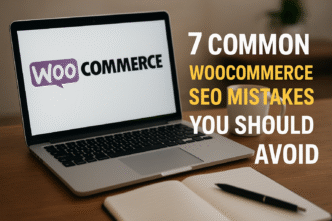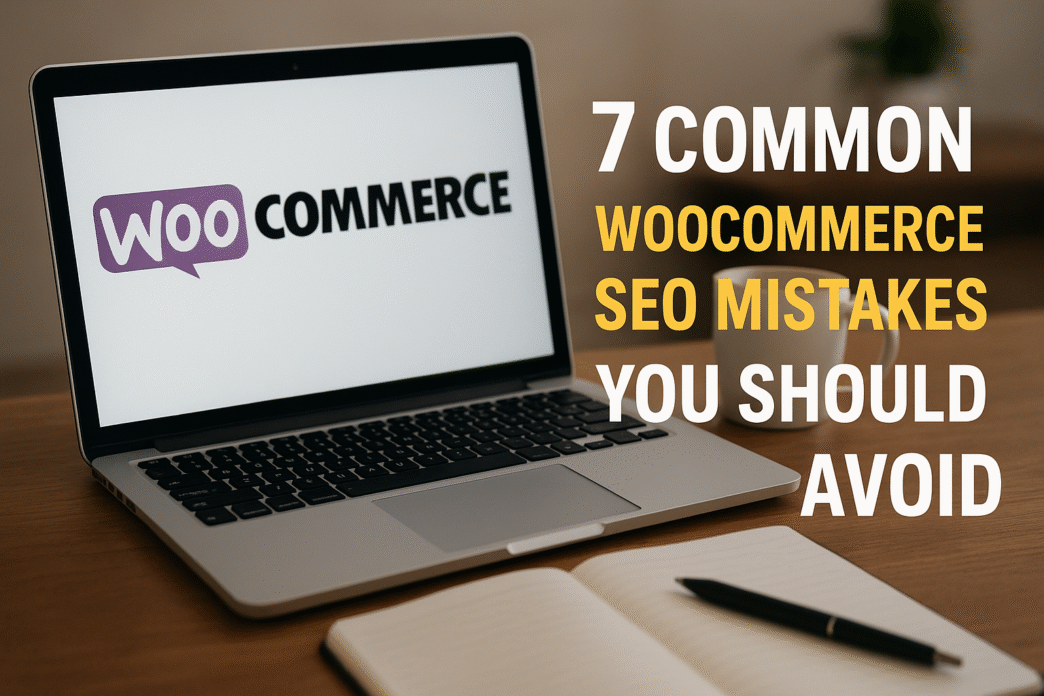When running a WooCommerce store, it may feel just like juggling flaming torches. After all, you have to handle orders, manage products, grow your brand, and also respond to customers, all at the same time. While tackling all these tasks, SEO is often neglected or relegated to the bottom of your to-do list. However, your beautifully designed store may easily get lost in the huge eCommerce universe if you don’t work on a strong WooCommerce SEO strategy.
To be honest, WooCommerce SEO is not about adding a few keywords here and there. It’s more about curating a store that not only search engines but humans also want to engage with. But overlooking proper content strategies, small technical oversights, and other pitfalls may gradually sabotage your sales and online visibility.
In this blog, we’ll discuss 7 common WooCommerce SEO mistakes and how to avoid them to ensure your store gets good web traffic from the right audience.
7 Common WooCommerce SEO Mistakes (and How to Fix Them for Better Traffic)
1. Improper Product Page Optimization
Your product pages are a major part of your WooCommerce store. However, many store owners don’t consider optimizing them well. This includes non-SEO-friendly URLs, improper or missing meta descriptions, and poorly written product descriptions.
Mistake: Copying default product descriptions from manufacturers or suppliers.
Solution: Consult a professional WooCommerce SEO company to help you create unique and compelling product descriptions and add keywords naturally. Additionally, optimize meta descriptions, product titles, and images (with alt text) to increase online visibility. Make sure the URLs are short, keyword-rich, and descriptive. For instance, instead of adding www.example.com/product123, it’s best to include www.example.com/mens-running-shoes-flat-feet.
2. Neglecting Keyword Research
When it comes to SEO, keyword research is the backbone for success. However, many WooCommerce store owners begin content creation without understanding what their target audience searches for online. This leads to the creation of blog posts and webpages that don’t attract traffic or ranking.
Mistake: The major mistake that many store owners make is that they use generic keywords, like “shoes,” rather than high-intent or specific keywords, such as “women’s running shoes for flat feet.”
Solution: Spend proper time doing keyword research using tools like SEMrush, Google Keyword Planner, or Ahrefs. These tools help in finding relevant keywords with the right balance of competition and better search volume. Every product page must target one primary keyword and some secondary keywords.
3. Duplicate Content Issues
Duplicate content is another major problem related to SEO for WooCommerce, particularly if you have multiple product variations or similar products. In such cases, search engines find it hard to determine which web page to rank. So, it dilutes your SEO efforts.
Mistake: Creating multiple product pages with the same descriptions or not adding any variations to the descriptions.
Solution: Make use of canonical tags for indicating the primary page to search engines. Also, write unique product descriptions for every product variation. You can even consider consolidating similar products under a single page to prevent content duplication. With regular audits of your website, you can easily identify and correct such duplicate content problems.
4. Overlooking Site Speed and Performance
Website speed is another critical factor for SEO. If you have slow-loading WooCommerce stores, it may frustrate users and increase bounce rates while negatively impacting rankings on search engines.
Mistake: Adding unoptimized images, using heavy themes, or adding excessive plugins that slow down your online store pages.
Solution: Make use of a lightweight WooCommerce theme, optimize images, and utilize caching solutions. You can use tools, like GTmetrix or Google PageSpeed, to identify website performance issues. When you have a responsive, fast-loading store, it not only improves your search engine rankings but also improves user experience while leading to higher ROIs with more conversions.
5. Neglecting Mobile Optimization
Nowadays, more than half of the online traffic comes from mobile devices. So, it is essential for WooCommerce stores to be mobile-friendly for a better user experience. If your store is not mobile-optimized, you may lose a significant number of your potential customers.
Mistake: Using website designs that are more desktop-focused and do not adapt well to mobile screens.
Solution: Make sure to use a fully-responsive and mobile-friendly WooCommerce theme. After implementing a theme, test your website on different screen sizes and devices to confirm seamless navigation, checkout processes, and speedy product page loading. A mobile-optimized store is perfect to boost search engine rankings and user experience.
6. Poor Site Structure & Improper or No Internal Linking
A proper website structure with strategic internal linking can help search engines to efficiently crawl your website while enhancing the user navigation experience. But unfortunately, there are many WooCommerce stores with poor site structure.
Mistake: Adding several product pages that remain buried deep within a site, and without links between related products.
Solution: Consider organizing your online store into proper categories and subcategories. Make sure of enough internal links for connecting related blog posts, related products, and landing pages. When a site has a logical structure, it not only helps in proper web page indexing on search engines but also keeps users engaged for longer. This helps in increasing the chances of more conversions.
7. Not Encouraging Reviews and Ratings
The user-generated content, like reviews and ratings, can significantly increase SEO, as well as customer trust. However, many WooCommerce stores don’t encourage reviews and ratings or simply fail to showcase them in an effective manner.
Mistake: Depending completely on product descriptions without making the most of reviews for SEO advantage.
Solution: Encourage your online customers to leave ratings and reviews on your products. Consider integrating schema markup for reviews to showcase rich snippets in search results. This also increases click-through rates, enhances a store’s credibility, and can boost rankings for product-specific searches.
How to Avoid These Mistakes and Boost Your WooCommerce SEO
You need to follow a proactive approach to avoid the given mistakes. When you team up with a professional WooCommerce SEO company, you’ll see a significant difference in SEO rankings. A specialized SEO company understands the nuances of different online stores, including keyword targeting, product optimization, content strategy, and technical SEO.
When you invest in the best SEO services company, your store not only starts attracting more traffic but also sees visitors converting into loyal customers. From website structure optimization to implementing advanced SEO tactics, expert guidance is vital to keep you ahead of your competitors.
Conclusion:
WooCommerce store optimization for SEO can be quite complicated. But it’s important to focus on SEO for your long-term success. Avoiding the common mistakes, like duplicate content, poor keyword research, etc. is the first step towards improvement.
Skylark SEO is a reliable WooCommerce SEO Company that provides customized SEO strategies for different types of e-commerce businesses. Combining deep understanding of customer behavior with technical expertise, Skylark SEO ensures your WooCommerce store attracts more quality traffic to rank higher and attain measurable results.
So, don’t wait any longer! Invest in professional WooCommerce SEO services today to watch how your business thrives with better online visibility with higher conversions, and more traffic.













